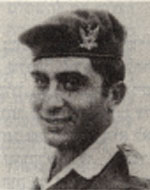Uziel, Shlomo
Shlomo, son of Berta and Jacob, was born on April 20, 1950, in Ramat Gan, where he returned to Turkey where he studied for three months, where he studied in a Jewish school, He grew up with a natural talent for painting, and even when he was three years old he used to paint everything he saw, and he did it with amazing accuracy, He studied in the Ostrovsky High School and during his free time played soccer and served as a sports instructor for a local youth organization. In the course of the Six-Day War, when he was a student in the 11th grade, he volunteered for national service in hospitals. Shlomo was drafted into the Israel Defense Forces in mid-November 1968 and assigned to the Israel Air Force, where he completed a long series of anti-aircraft gunning courses. When he was released from regular service in mid-November 1971, he volunteered for regular army service. Maj. Yaakov said of him: “As a rookie, he came to the battalion when it was founded, volunteering, despite fears about the fate of his family and his distance from it. Already in the War of Attrition in the Sinai, when he was stationed in the line of strongholds, he stood out from all his friends, jumping barefoot on a turret and firing the planes that came to attack his fortress. He finished his regular service against a senior official, but the warm and sympathetic attitude of his commanders and subordinates prompted him to continue his service. Thus, under difficult and exhausting conditions of service, he volunteered for regular army service. With great luck, Shlomo went through the Yom Kippur War without a scribble, even though he fought on the first line and endangered himself many times under enemy fire. When the war ended, his friends joked that it was his low height that made it possible to wear a suit of fire over his head without being damaged. But only a short time, and immediately found himself with his unit in a cruel and cruel war on the Golan Heights. In his capacity, he was given the opportunity to act from the home front as a manager of a fighting unit. However, this contradicted his character and his aspirations, and at every opportunity he found a reason to move to the positions of his soldiers and to be with them. “On 21.4.1974, it was a fateful day when the unit lacked an officer to carry out a mission at the” Mount Hermon “post. Shlomo did not hesitate, and despite the fact that it was much more than was required of him, he completed the task: Twelve hours later, the news was received that Shlomo, exposed in the position as usual, was hit by enemy fire and fell to eternal rest in the cemetery in Ra’anana. In a letter of condolence to the bereaved family, his commander wrote: “Shlomo has two qualities that we will never forget: courage, and being loved by his commanders and subordinates alike. I will not exaggerate if I say that by any standard, Shlomo is part of the elite group, which is the basis of our army. “
